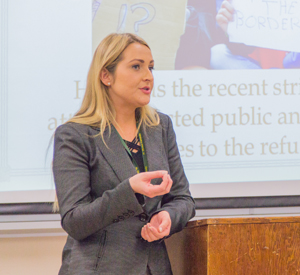
Human Rights professor Dr. Christina Szurlej is advocating for greater protection of individual rights within Bill C-59 which seeks to revamp Canada’s national security framework.
Bill C-59 is the government’s response to consultations on Canada’s Anti-terrorism Act, 2015 to ensure “national security laws and policies reflect the rights, values and freedoms of Canadians.”
Szurlej appeared before the House of Commons Standing Committee on Public Safety and National Security in Ottawa to comment on the Bill.
“It has some positive aspects like creating an Intelligence Commissioner and National Security and Intelligence Review Agency, but other parts of the Bill overstep human rights protections, including privacy and fundamental freedoms,” says Szurlej.
The Bill allows for bulk collection of ‘publicly available’ information ‘relevant’ to the work of the Canadian Security Intelligence Service (CSIS) without the consent or knowledge of Canadians. No direct link to preventing threats to security would need to be established.
“This can result in or encourage commodification of personal data, where third parties sell information the individual thinks is private. Third parties can include hackers who have obtained the information through illegal means.”
Another risk is if Canadians don’t know what information has been collected, they can’t challenge its authenticity. This is problematic when advancements in computer software are making it easier to fabricate information.
Face2Face technology, for example, allows the user to superimpose their facial expressions and movements onto any face captured on video. The result is a realistic-looking video of the subject saying anything the user wants. This could interfere with the presumption of innocence and the right to a fair trial, especially if bulk data is used to predict the likelihood of an individual committing an office.
Algorithms could even be misused to gain a significant advantage during elections by identifying undecided voters and revealing how to sway them.
“If this pillar of Canadian values falls, so too does individual security, self-fulfillment, autonomy, and a thriving democratic society,” she said.
“Today we are at a crossroad. Canadians need to ask if this is the direction we want to take as a nation.”
-(2).jpg)
/filters:format(webp)/prod01/stuca/media/stu/site-assets/images/features/DalCupnews.jpg)
/filters:format(webp)/prod01/stuca/media/stu/site-content/news/DeansListnews.jpg)
/filters:format(webp)/prod01/stuca/media/stu/site-assets/images/features/Internship-Lauren-Feature.jpg)